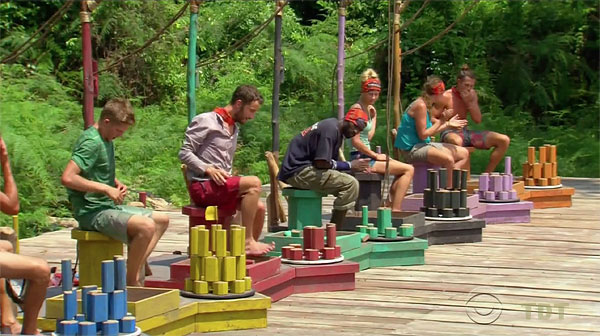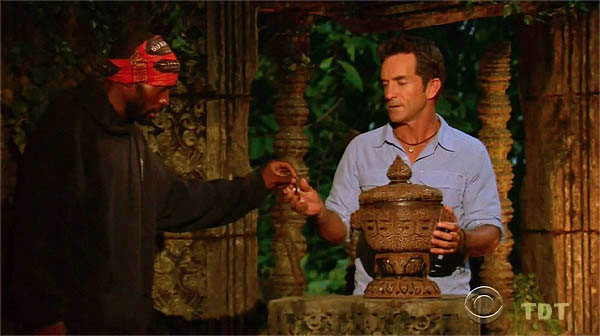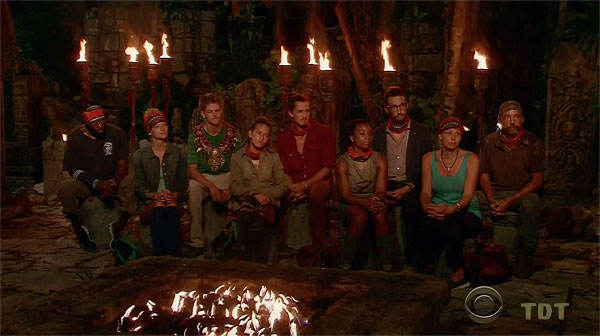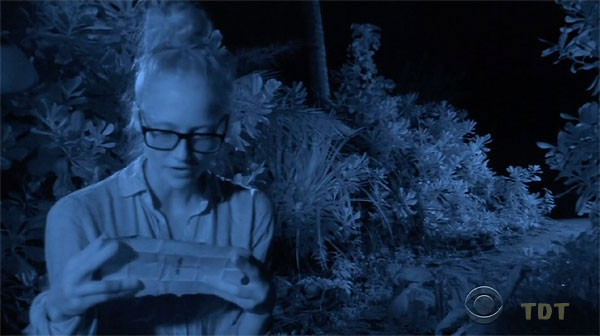

Yes, I know this season kicks some serious butt. And I know I’ve been saying this for, basically, the entire season. But let’s all boycott the show. How dare they give us two amazing hours of television right before Thanksgiving? How are we supposed to analyze it properly?
You see, it’s all CBS’ fault you’re getting this column a couple of days late. It’s not my fault. Nope, not at all. It didn’t have anything to do with me eating way, way too much food. Nope. It’s all on CBS. Damn them.
But, seriously, what a great appetizer to what was hopefully an awesome holiday for you all. Now let’s talk about voting blocs.
As you all probably know, for two weeks, I’ve been preaching that the voting bloc theory just didn’t pass the eye test. This was a theory thrown out there by a couple contestants (ahem, Stephen) that basically made these returning players feel special, like they were more advanced players than anyone else. It’s basically, “Hey look Probst. We’re so amazing we’ve invented an entire new way of playing the game.” Yeah, not so much. We’ve seen this all before.
Until now, maybe.
This is the part of this here column when we bring in some theory. Let’s talk about social constructionism theory. Introduced to the world of sociology and beyond in 1966 by Peter Berger and Thomas Luckmann through an amazing book called The Social Construction of Reality, social constructionism is basically a theory that describes how knowledge is developed. In my field, we often use it to describe how, for example, norms and routines become essential to news production.
What does all this mean? Well, social constructionism, like many theories of knowledge, argues that knowledge is built in a specific manner. For social constructionism, two ideas are essential to the theory. Before we talk about those, though, I should stress that social constructionism is, even though it comes from sociology, a theory based on communication. You see, communication drives our experience, it’s how we make sense of the world and it’s how we pass along knowledge.
So, the two ideas. First, social constructionism is like cultivation theory, sort of, (which we talked about a couple weeks ago), in that it argues people make sense of the world around them, or rationalize it, by deciding how they believe the world works. Second, the way people talk about things, their language, is how people communicate their reality and how it spreads.
Another key thing that social constructionism examines is how things become institutionalized. Basically, what that means is that when we study something utilizing social constructionism, one of the main things we look at is institutionalized behaviors or norms and how they became that way. So for media scholars, for example, maybe we study a news organization and see that everyone reports stories in the same way. How did that behavior become institutionalized? Probably through communication in some way.

I think we can explain the voting bloc using social constructionism. You see, as I’ve argued, the idea of the voting bloc has been totally overused by both the contestants and Probst. They just keep talking about it even though we know the players are acting in the same way they’ve always acted. We’ve seen this stuff before. We’ve seen it in Cagayan and other seasons. But they keep talking about voting blocs.
Do you see where I’m going here?
While the players have been executing some very good strategy and playing a fun, exciting game, they have not been practicing some new form of gameplay. Their idea of voting blocs is not new. But they kept talking about voting blocs. They kept communicating the idea of the voting bloc. Probst joined in. Over time, the idea of the voting bloc became institutionalized and, this week, I think we saw some actual voting bloc plays.

For example, do we think Jeremy uses his idol on Stephen if he thought he was part of a large alliance and not simply a small voting bloc? I don’t think so. All the talk about voting blocs made Jeremy think he needed to keep Stephen in the game. Does Spencer flip on Jeremy and Stephen if doesn’t think there’s amorphous voting blocs that change each vote? I’m not sure. Does Stephen make everyone split that last vote if he doesn’t believe in the blocs? I sure don’t think so. Earlier in the season, before the bloc talk, we saw Savage go home because everyone was scared to split the vote. Not this time.
So, we’ve seen how the idea of voting blocs have affected the season so far. Does it keep going this way? I, for one, am excited to find out.
Now let’s talk about the Second Chancers still left in the game. This list keeps getting smaller and smaller …
Orkun

- 1. Spencer — So Spencer flipped on Stephen. And he tricked Stephen along the way. That’s a good look for Spencer. He’s also the one who finally broke Joe’s immunity challenge streak. Not a bad episode(s). But, of course, earlier in the season, Spencer talked and talked and talked and talked. Now he’s a background player again. You know, like someone who comes in third or fourth.
- 2. Abi-Maria — Speaking of fading into the background. Abi’s barely in the game anymore. But, hey, I am certainly not complaining. I do think, though, it’d make me happy if she left the game soon. She’s the only useless player left. Well, I guess you could argue Keith too, but if you made that argument, I’d spit on you.
- 3. Joe — So trivia and feet. Those are Joe’s kryptonite. If there’s ever a challenge where the contestants have to answer trivia questions about feet or using only their feet or questions about feet using only their feet, well, I’ll take the field in that challenge. And maybe Joe goes home then.
 4. Kelley — For some reason, I don’t particularly care for it when producers randomly give someone a clue to an idol. I know it happens a lot, and I know it’s technically fair, but I feel like people should have to do something for a clue, especially when we all know that at this point, a clue means an idol. But… good for Kelley. Another strong week for her. My prediction is she’ll use another idol effectively, but she’ll leave the very next week, probably around final five.
4. Kelley — For some reason, I don’t particularly care for it when producers randomly give someone a clue to an idol. I know it happens a lot, and I know it’s technically fair, but I feel like people should have to do something for a clue, especially when we all know that at this point, a clue means an idol. But… good for Kelley. Another strong week for her. My prediction is she’ll use another idol effectively, but she’ll leave the very next week, probably around final five.- 5. Keith — If I ran a network, say CBS, I would hire Keith to star in a new reality show. Basically, I’d want to film Keith in different kinds of places, interacting with different kinds of people. He could help teach us all about different cultures. How would we choose where Keith visited? That’s simple. We’d lay a large world map on the ground, spin Keith around like 20 times till he’s really dizzy, then he’d spit. Wherever his loogy lands, we send Keith. I’ll call the show Keith Spits. It’s a hit, Jerry, it’s a hit. But, yeah, I know, it’s CBS, so Keith would star in something like NCIS: Vancouver.
- 6. Jeremy — You know what Jeremy reminds me of right now? Jeremy reminds me of the Patriots. He’s basically better than everyone else and he’s barreling his way toward a championship. Now, I wrote that last sentence before the Pats-Broncos game. Here’s hoping I didn’t just jinx both the Patriots and Jeremy. He’d probably not like me then.
- 7. Kimmi — When is Kimmi going to take charge of this game and win this thing? Oh I joke because I love. I just want Kimmi to start talking again. Bring back Monica or something so that Kimmi can get upset again.
- 8. Tasha — This was not a good week for Tasha. I still think she’s going to last for a while, but she’s really been out of the loop or in the minority a decent amount lately. You know that Tasha has a plan to win this thing, but she’s got to start making moves. C’mon Tasha. Go for it.
I hope everyone’s successfully digested your Thanksgiving feast and you’re ready for work Monday. Talk to you next week.
 Pat Ferrucci started watching Survivor when episode two of Borneo first aired. He’s seen every episode since. Besides recapping here, he’ll be live-tweeting this season from the Mountain Time Zone. Why? Because nobody cares about the Mountain Time Zone except when they want to ski. Follow him @patferrucci for Survivor stuff and tweets about anything and everything that enters his feeble mind.
Pat Ferrucci started watching Survivor when episode two of Borneo first aired. He’s seen every episode since. Besides recapping here, he’ll be live-tweeting this season from the Mountain Time Zone. Why? Because nobody cares about the Mountain Time Zone except when they want to ski. Follow him @patferrucci for Survivor stuff and tweets about anything and everything that enters his feeble mind.
- Index of articles
- Pre-season preview
- Ep.1: Vytas, SIT down
- Ep.2: Varner teaches the Old School
- Ep.3: Tasha sets the Tribal agenda
- Ep.4: Abi continues cultivating an irrational gameplan
- Ep.5: Let's get ethical
- Ep.6: Follow the leader... or not
- Ep.7: Framing how it all went down
- Ep.8: Second Chance primed for an incredible end game
- Ep.9: Did Stephen just open or close the gate to winning?
- Eps.10-11: Construction junction, how do you function?
- Ep.12: Spiraling toward what could be an amazing end
- Ep.13: Planning behavior before the finale
- Ep.14: Wrapping up a stellar season